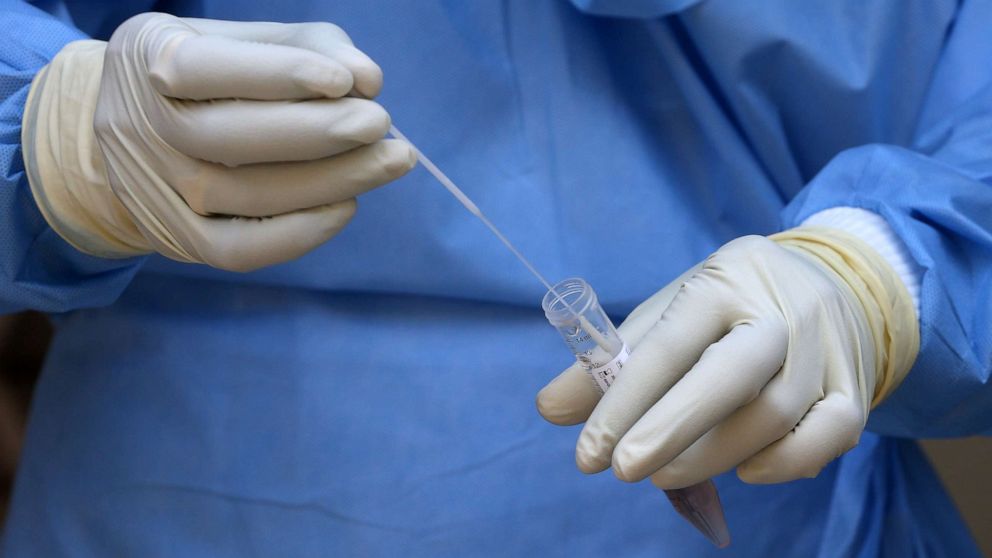[ad_1]
Over the past few weeks researchers have been discreetly studying a new potential treatment for COVID-19 — and it might not be what you expect.
The treatment in question is called famotidine, and it’s the active ingredient in Pepcid, an over-the-counter medication commonly used to alleviate heartburn.
Since March 13, researchers at Northwell Health, a network of hospitals in New York, have been enrolling patients hospitalized with COVID-19 into their study of famotidine, which is being delivered through an IV in megadoses nine times greater than the typical over-the-counter dose. The drug is being given in combination with the much-touted antimalarial hydroxychloroquine.
Researchers said some data on safety will be available “in a few weeks,” but did not say when data will be available showing whether the drug combination is effective.
Dr. Kevin Tracey, CEO and president of the Feinstein Institute for Medical Research at Northwell Health, says the study was being conducted under the radar to avoid media attention as well as a potential depletion of national supply, limiting Northwell’s access to the drug.
More than 180 patients have enrolled in the Northwell study so far. They’ve been given either a two-drug combination of hydroxychloroquine and famotidine, or hydroxychloroquine alone. According to Tracey, hydroxychloroquine was added into the mix because of the drug’s promise back in mid-March — before data emerged about its potential risks.
Tracey said the idea to try famotidine came from a friend and colleague, Dr. Michael Callahan, who had recently visited China and was working with Chinese physicians on a still-unpublished study reportedly showing that the drug benefited patients with COVID-19.
The merit of trying famotidine was supported by additional research, part of a private-public partnership with the federal government, that used the genetic makeup of the virus to pinpoint potentially promising drugs, Tracey said.
The hope is that famotidine will act as a decoy for the virus, so that while the virus is preoccupied with famotidine, it is unable to reproduce itself and spread throughout the body.
Dr. Stuart Ray, professor of medicine in infectious diseases and vice chair of medicine for data integrity and analytics at Johns Hopkins, said he was surprised to hear that researchers at Northwell are studying famotidine in people with COVID-19, and that he is skeptical about preliminary data from China because it has not been vetted in the typical review process.
However, he said he is glad there is some scientific rationale behind the drug. He adds that despite the megadoses, the drug is likely to be safe.
“I think this sort of off-label repurposing is sensible with drugs for which we have a long safety record,” said Ray. “And we really need a win.”
As of Sunday, the study was not yet listed in the national online database of clinical studies maintained by the National Institutes of Health for the benefit of both the public and health care professionals.
Dr. Carlos Del Rio, chair of the Hubert Department of Global Health at Emory University’s Rollins School of Public Health, is suspicious of this delay in posting details about the trial, noting that researchers should publicly announce their intention to run a study like this before they start enrolling patients.
“Science has to be open, not secretive,” he said. “We want transparency in clinical trials.”
Del Rio added that when it comes to the promise of famotidine, “we have to remain skeptical.”
“In the early years of HIV, we tried a lot of stuff and we thought, ‘Oh this is going to work’ and nothing worked,” he said. “When you have a disease for which there is no treatment, all sorts of different things are tried and everyone is excited about them.”
Tracey, meanwhile, cautioned people to steer clear of trying out unproven treatments themselves.
“What we want everybody to do is send us our best wishes that if it works, we can find out quickly,” he said.
Heather J. Kagan, M.D., is an internal medicine resident at The Johns Hopkins Hospital and is a contributor to the ABC News Medical Unit. Sony Salzman is the unit’s coordinating producer.
What to know about the coronavirus:
Tune into ABC at 1 p.m. ET and ABC News Live at 4 p.m. ET every weekday for special coverage of the novel coronavirus with the full ABC News team, including the latest news, context and analysis.
[ad_2]
Source link

